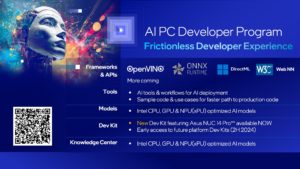Development Tools for Embedded Vision
ENCOMPASSING MOST OF THE STANDARD ARSENAL USED FOR DEVELOPING REAL-TIME EMBEDDED PROCESSOR SYSTEMS
The software tools (compilers, debuggers, operating systems, libraries, etc.) encompass most of the standard arsenal used for developing real-time embedded processor systems, while adding in specialized vision libraries and possibly vendor-specific development tools for software development. On the hardware side, the requirements will depend on the application space, since the designer may need equipment for monitoring and testing real-time video data. Most of these hardware development tools are already used for other types of video system design.
Both general-purpose and vender-specific tools
Many vendors of vision devices use integrated CPUs that are based on the same instruction set (ARM, x86, etc), allowing a common set of development tools for software development. However, even though the base instruction set is the same, each CPU vendor integrates a different set of peripherals that have unique software interface requirements. In addition, most vendors accelerate the CPU with specialized computing devices (GPUs, DSPs, FPGAs, etc.) This extended CPU programming model requires a customized version of standard development tools. Most CPU vendors develop their own optimized software tool chain, while also working with 3rd-party software tool suppliers to make sure that the CPU components are broadly supported.
Heterogeneous software development in an integrated development environment
Since vision applications often require a mix of processing architectures, the development tools become more complicated and must handle multiple instruction sets and additional system debugging challenges. Most vendors provide a suite of tools that integrate development tasks into a single interface for the developer, simplifying software development and testing.

Advantech to Showcase Industry-leading AIoT Solutions at Embedded World
Embedded World, April 9-11 2024, Hall 3, Booth 339 Taipei, Taiwan and Nuremberg, Germany, 2nd April 2024 — Advantech, a leading provider of AIoT platforms and services, today announced its participation at Embedded World 2024, a trade show taking place in Nuremberg April 9-11, 2024. Visitors will find Advantech’s 160 m2 booth in Hall 3,

Where Nvidia’s Huang Went Wrong on Thomas Edison vs. AI
The tech industry’s self-congratulatory analogy of AI with electricity “is not absurd, but it’s too flawed to be useful,” says historian Peter Norton. What’s at stake: In Silicon Valley, power prevails. In the short run, if your business and technology have the power to make money, move the market, and change the rules, you won’t

Unlocking Peak Generations: TensorRT Accelerates AI on RTX PCs and Workstations
This blog post was originally published at NVIDIA’s website. It is reprinted here with the permission of NVIDIA. TensorRT extension for Stable Diffusion WebUI now supports ControlNets, performance showcased in new benchmark. Editor’s note: This post is part of the AI Decoded series, which demystifies AI by making the technology more accessible, and which showcases

What is an NPU, and Why is It Key to Unlocking On-device Generative AI?
This blog post was originally published at Qualcomm’s website. It is reprinted here with the permission of Qualcomm. The NPU is built for AI and complements the other processors to accelerate generative AI experiences The generative artificial intelligence (AI) revolution is here. With the growing demand for generative AI use cases across verticals with diverse

Intel Announces New Program for AI PC Software Developers and Hardware Vendors
Intel expands its AI PC Acceleration Program to better equip software developers and independent hardware vendors. What’s New: Intel Corporation today announced the creation of two new artificial intelligence (AI) initiatives as part of the AI PC Acceleration Program: the AI PC Developer Program and the addition of independent hardware vendors to the program. These are

Lemur Imaging Demonstration of High Quality Compression Compared to Standard Quantization Techniques
Noman Hashim, CEO of Lemur Imaging, demonstrates the company’s latest edge AI and vision technologies and products at the March 2024 Edge AI and Vision Alliance Forum. Specifically, Hashim demonstrates Lemur Imaging’s high-quality memory reduction (LMR) image compression technology on different networks, showing that compression outperforms quantization in edge AI subsystems. The image quality delivered

Enabling the Generative AI Revolution with Intelligent Computing Everywhere
This blog post was originally published at Qualcomm’s website. It is reprinted here with the permission of Qualcomm. This post originally appeared on World Economic Forum on January 15, 2024. Generative artificial intelligence is era-defining and could benefit the global economy to the tune of $2.6 to $4.4 trillion annually. To realize the full potential of

Blaize Releases Picasso Analytics
A new easy to use framework and toolkit to empower developers and accelerate advanced analytics for edge AI applications El Dorado Hills, CA, March 20, 2024 — Blaize, a leading provider of full-stack artificial intelligence (AI) solutions for automotive and edge computing in multiple large and rapidly growing markets, announced today the availability of a

